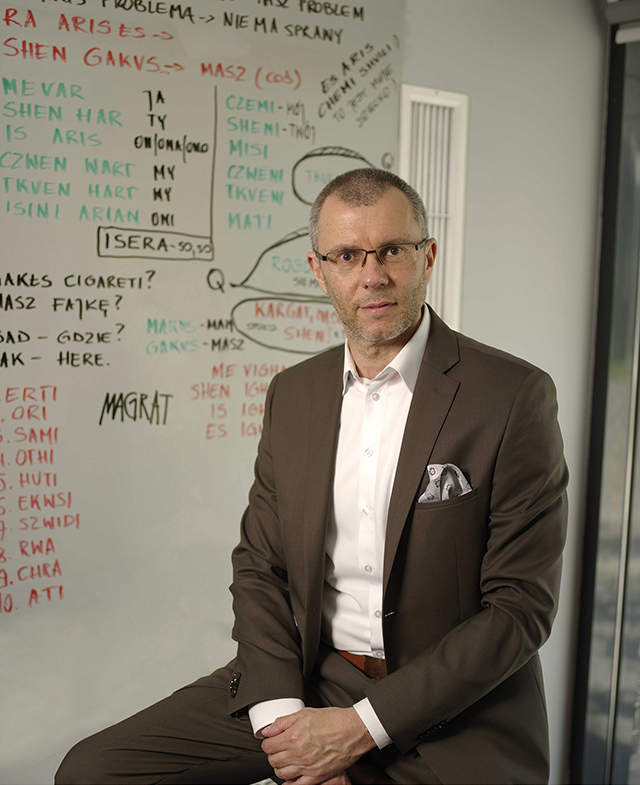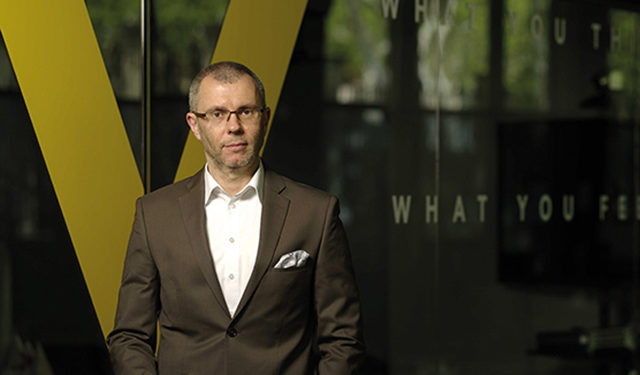“There is a saying I really like: ‘be the leader you would want to have.’ I have the privilege to work with leaders who care about my view, who always make time to talk to me. I can hardly imagine any other way of effective interaction with people, whether it is about the business or some other matter.” – Andrzej Malinowski
A recent LinkedIn post by Veon Georgia is a visible example of how intertwined employee happiness and increased profitability are. We asked Andrzej Malinowski how correlated the two are, and how long Veon has been observing the trend.
“We have been tracking the engagement of our team for quite a long time now, and added the enablement index to the indicators a bit later,” he tells us. “The two are equally important for creating an employee-centric working environment, which in turn facilitates business growth. Engagement in simple terms answers the questions “do you want to work in this particular company?” and “do you want to put extra effort in for the good of the organization?” Enablement is more about “can do.” It shows how our teammates view the utilization of their knowledge, skills and abilities, and if the organizational environment supports them in getting their work done in the best possible manner. We have always regarded those two components as the key success factors for our business. Recent results showed the trend we were aiming to achieve.
Data presented on the graph dates back to 2017 and covers the subsequent years, so there is strong evidence to believe it is not a coincidence of any kind.
“Building an employee-centric culture is one piece of the puzzle; another, equally important, one is to be clear about the purpose. Like every other commercial organization, we are responsible for increasing shareholder value and growth of the business; we all manage, to play our respective roles. In other words, our long lasting focus on a work environment based on respect, integrity, open communication, support and care is the foundation for growth, measured by financial indicators.
“The correlation is visible even at first glance: our teammates don’t just appreciate being part of a culture that puts them at the very center of the business, but also have absolute clarity about company objectives, and so deliver a top-notch performance.”
Why did the negatives of 2020 not affect the results?
It’s not entirely true. Our country and its economy have suffered due to COVID-19. Our company is part of Georgia’s economy and, obviously, we faced unprecedented challenges last year. I am completely sure we did everything in our power to face and overcome the challenges, but our ambitions were bigger, and some of our plans had to be deprioritized.
That said, connectivity as an industry didn’t suffer as much as other industries crucial to our country’s economy. During difficult times, people need to stay connected, and the technology they use for that purpose is in a way secondary. I’m glad we have managed to provide our customers good quality service during the tough times. I also very much hope the Georgian economy will recover fast and we will be able to achieve our ambitions.
Speaking of corporate culture and the limited negative impact of COVID on our performance, I have to underline an important correlation between the two. Our key priority from early 2020 was to ensure our team is safe, no matter the location, no matter the role. With this done, we shifted to full scale work from home, then switched to work from anywhere – which we intend to continue going forward. We took care of our people from day one, taking this worry off their backs, so they could focus on fulfilling their respective jobs. We offered our colleagues working in the retail network, when shops closed, access to an online learning platform to make good use of their time so they could gain new skills. The true “frontline heroes,” our colleagues from the network development and maintenance teams, could not work from home because of the nature of their job. But we managed to provide them with all necessary protective measures and resources, so they were safe while working. My great thanks goes to each one of our engineers for their tireless work, despite all the limitations and challenges. All our objectives in that area were successfully completed.
I’m proud of our team on a job well done. This is how we have managed to not only survive 2020, but also complete a vast majority of our tasks.
The data certainly shows success. What do you think was the main contributor to growing both dimensions?
I would like to emphasize very strongly that there is only one contributor to our success, and it is the team of more than 350 talented, skillful, dedicated and hardworking people I have a great privilege to lead. I know it might sound cliché, but it is the only honest response I can think of. Ever since I joined Veon Georgia in April 2017, I have been amazed at the outstanding performance of the team, with everyone’s internal drive to perform better and to utilize all growth opportunities. It is quite probably the very definition of happiness for any leader. It definitely makes me very happy.

What is the role of a leader in creating employee satisfaction, and what are some of the methods to know regarding employee satisfaction in particular?
Personally, I don’t see a distinction between interacting with any other person and interacting with a teammate. Leading is not about the leader; leading is all about those whom you lead. If your leadership includes respect, integrity, treating the team with understanding, it is set for a success. Creating employee satisfaction is not a task on your daily “to do list”; it doesn’t work that way. Let me give you an example: I have a tradition of congratulating our female teammates on their birthdays by visiting our stores and offices in Tbilisi with a bouquet of flowers and best wishes. I have been doing this for two years now, and I don’t do it to improve employee engagement index by X points; I do it because I know how hard they work and how important it is for all of them to hear personally from me, especially when it coincides with birthday wishes. My colleagues in the regions do the same on my behalf, as for obvious reasons I cannot make it out to all our locations countrywide. The key thing for me is to make sure all the Veon Georgia team members know the company cares for and appreciates them. If you want to call it our secret ingredient (well not so secret anymore), it works for me, though I wouldn’t call it a “method”. It is way of thinking, a way of interacting with people in general.
What is the most reliable way to measure employee satisfaction and happiness, in your practice?
I don’t know if it qualifies as a method, but for me there is no better way than just talking to people you work with. Ivory Tower management is a key to failure, and I want to believe it is part of the past; at least it has never been my way of working. There is a saying I really like: “be the leader you would want to have.” I have the privilege to work with leaders who care about my view, who always make time to talk to me. I can hardly imagine any other way of effective interaction with people, whether it is about the business or some other matter.
In a more systematic manner, we run surveys measuring key aspects of our work-related behavior. As I have already mentioned, we ask our teammates about their engagement and enablement. The results of those surveys, conducted by a third party, are compared to market averages in our industry. We at Veon Georgia score higher than the industry benchmark in all aspects. It is worth underlining that that industry benchmark includes the same indicators measured in the same manner across best performing companies globally.
Given that the surveys have been conducted for a couple of years now, we can track the dynamics, not just high-level ones, but more importantly deep in respective areas, like management team integrity and individual career goals achievement. We are proud to see progress in many areas, and clear messages showing us where we have to try harder.













